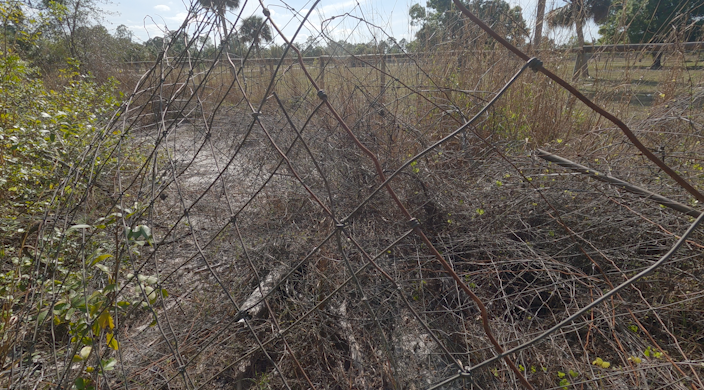‘Booby traps’ reported on ATV trails in Golden Gate Estates

Large amounts of rusty barbed wire along an ATV trail north of the Orangetree community
Click here for updates on this story
NAPLES, Florida (WBBH) — On two commonly used all-terrain-vehicle (ATV) trails in Golden Gate Estates, frequent riders have reported “booby traps” being placed around blind corners and in hard-to-see locations.
During a ride out to the locations, Gulf Coast News found:
Barbed wire strung between trees at neck height 4-foot holes covered with vegetation Chunks of metal in the middle of pathways
“People are coming out here for the freedom to go shoot their guns and ride four-wheelers and have big bonfires … Just doing stuff like this, it’s not acceptable,” said Brandon Stearns, a lifelong ATV rider who has encountered man-made barricades.
All-terrain-vehicle riding is legal in both the State of Florida and Collier County, under strict guidelines. According to the Collier County Sheriff’s Office (CCSO), you must:
Use public, dirt trails that are off roadways Travel under 35 miles per hour Ride only during daylight
Local riders tell Gulf Coast News they have followed all regulations — and both primary locations they frequent, north of Orangetree and Golden Gate, are undeveloped, unmarked, and have no fences or signage.
“This isn’t really maintained by the county or the state … You can’t just get rid of it (the trails) or put dangerous obstacles and say, ‘Oh, now you can’t [ride here].’ Fence it off, make it known that you don’t want people there—without harming people. You can’t hurt people trying to get your point across,” said Stearns.
Regardless of whether the land is public or privately owned, according to Florida law, placing obstacles that could cause serious injury is a criminal offense.
Under House Bill 1431, it is punishable by up to 10 years in prison, with even harsher penalties if someone is killed. Florida’s Stand Your Ground law also does not apply in this situation, as it is limited to cases involving a direct threat to someone’s residence or life.
“I know there’s people in the hospital right now from it … It’s a hidden hazard, you don’t know it’s there. You know, a piece of wire going 40 miles an hour—you don’t see that until you’re right up on it. You can and will die if you go fast enough,” said Stearns.
“It’s going to be a big deal. It’s going to be a lawsuit. Someone is going to die. Maybe then somebody’s going to come in and step up,” said Stearns.
Please note: This content carries a strict local market embargo. If you share the same market as the contributor of this article, you may not use it on any platform.